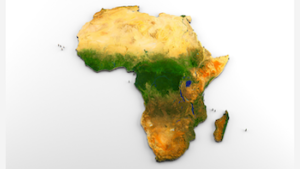
*The naming or designation of Africa is written about on this date in 3000 BC.
For a long time, the origin of the name “Africa” has been debated, as many historians have disagreed on how the continent got its name. The descriptive word “Africa,” for many of its 1.2 billion people, equates to a home of unequaled linguistic, ethnic, and cultural variety, the place of an ancient civilization. It reminds some of poverty and corruption, yet Africa is believed to be the continent where the first humans originated thousands of years ago.
But where did the name “Africa” come from? One view is that the word originated from the Romans, who named the land they found on the opposite side of the Mediterranean after a Berber tribe living in the Carthage area (now Tunisia). Some historians suggest that the word "Africa" may have originated from the Latin word "afri," which was used to refer to the Berber tribe of the Aourigha. The Romans called the region Afri-terra, meaning “the land of the Afri.” The Latin suffix -ica is used to denote a landmass as well. Historians suggest that the suffix “-ica” could also have been used to mean “the land of the Afri,” as in Celtica (a region of modern-day France), which was named after the Celtae who lived there.
In the 1st century CE, the Jewish historian Flavius Josephus wrote that the continent was named after Afer, the grandson of Abraham and a companion of Hercules, whose descendants are said to have invaded Libya. The Hebrew name for the continent, Auphirah, is said to be written as Ophir in many Jewish records. Another theory suggests that Africa was named after a Yemenite chieftain, Africus, who is said to have invaded North Africa around the second millennium BC. Legend says that upon founding a settlement in his newly conquered land, he named it “Afrikyah.” Some historians connect the name to the continent’s climate. Some believe the name came from the Greek word “aphrikē,” meaning “the land that is free from cold and horror.”
For others, it is a variation of the Roman word “Aprica,” meaning sunny, or the Phoenician word “afar,” meaning dust. Further, it is assumed that traders from modern-day India introduced the name. In Sanskrit and Hindi, the root word “Apara,” or Africa, translates geographically as a place that “comes after” or is to the west. Recently, some historians have debunked claims that the Greeks, Romans, Hindus, or Arabs created the name Africa.
They argue that Romans and Greeks started using the name right only after their first contact with African people, following the Romans. According to historian Ivan Van Sertima, the term “Afru-ika” means “birthplace” or “Motherland.” Essentially, “Afru-ika” means “to turn toward the opening of the Ka, womb or birthplace.” Other theories have equated “Africa” to the fourth Dynasty pharaoh, Khafre, who ruled from c. 2558 to 2532 BC. The belief is that modern Egyptologists have merged the order of the ancient Egyptian writing style of Kh-afre to mean Afre-Kh or Africa.